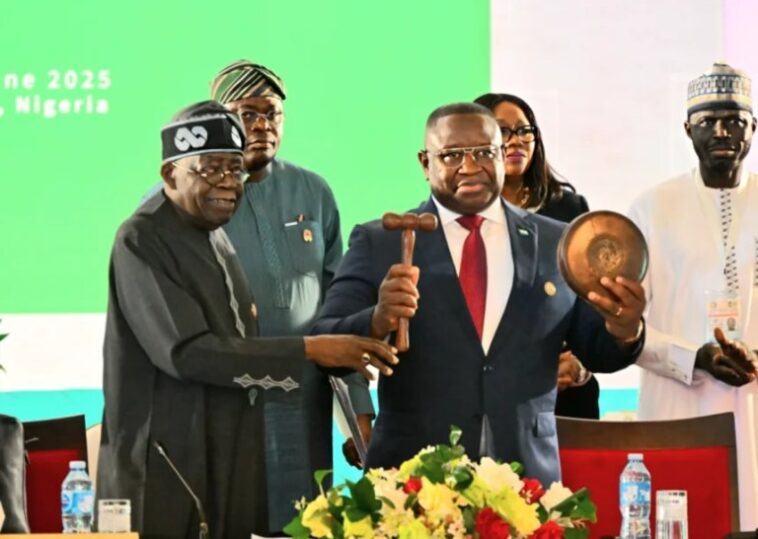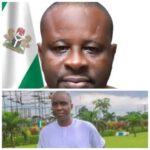Nigerian President Bola Ahmed Tinubu, on Sunday, officially handed over the leadership of the Economic Community of West African States (ECOWAS) Authority of Heads of State and Government to Sierra Leone’s President, Julius Maada Bio.
The handover ceremony took place at the closing of the 67th Ordinary Session of the ECOWAS Authority in Abuja.
President Tinubu’ who served two terms of ECOWSS Chairman described the role as a “profound honour and privilege,” expressing gratitude for the trust and support he received from member states.
As I now hand over the mantle of leadership to my great friend and dear brother, His Excellency President Julius Maada Bio of Sierra Leone, the new Chairman of the ECOWAS Authority of Heads of State and Government, I do so with a deep sense of fulfilment and optimism for the future of West Africa,” Tinubu said.
He expressed confidence that ECOWAS, with continued cooperation among member states, would achieve greater milestones in peace, security, stability, and prosperity across the region.
Reflecting on his tenure, President Tinubu acknowledged the complex political and security challenges confronting West Africa. He urged regional leaders to remain committed to addressing the evolving needs of their people.
“Let us deepen cooperation, uphold diplomatic principles, and foster inclusive growth that leaves no one behind—especially our youth, women, and vulnerable populations, who remain central to the future of our region,” he stated.
He also stressed that economic progress cannot be divorced from political stability.
“Our organisation must continue to strike a fine balance between its core regional mandate of economic integration and the complex political, security, and governance challenges, including the preservation of democratic values in our region.
“Economic integration cannot be superimposed on an untenable political environment. That is why we must remain steadfast in our resolve to rise to these emerging challenges,” Tinubu said.
He commended the ECOWAS Commission, community institutions, and technical staff for their dedication and professionalism, which contributed to a successful summit, and urged member states to maintain the momentum.
“As you return to your respective countries, let us remain resolute in our shared mission to deepen our integration, protect our people, and build a prosperous, secure, and united West Africa,” he added.
In his acceptance speech, President Julius Maada Bio outlined four key priorities that would guide his tenure: restoring constitutional order and deepening democracy, revitalising regional security cooperation, unlocking economic integration, and enhancing institutional credibility.
“We must engage transitional governments constructively and support member states in building stronger democratic institutions rooted in the rule of law,” Bio said.
He pledged to overhaul ECOWAS’ security architecture, improve intelligence-sharing, and establish stronger rapid-response mechanisms.
“The ECOWAS Trade Liberalisation Scheme, regional infrastructure, and cross-border value chains must become engines of job creation, trade, and resilience, especially for our women and youth,” he added.
On institutional reform, President Bio emphasised the need for a more transparent, efficient, and people-responsive ECOWAS.
“This is how we will rebuild trust in regional cooperation,” he asserted.
President Bio commended his predecessor, President Tinubu, for laying a solid foundation of regional dialogue, economic recovery, and peacebuilding.
“I am humbled to build upon the strong foundation you have established,” he said, praising Tinubu’s “experience and leadership.”
Addressing the broader challenges facing the region, Bio noted that West Africa is at a crossroads.
The democratic space is under strain in parts of our region. In some countries, the constitutional order has been disrupted. Yet, across West Africa, citizens—especially our youth—are demanding not just elections, but also accountability, transparency, and a fair stake in national life,” he concluded.



